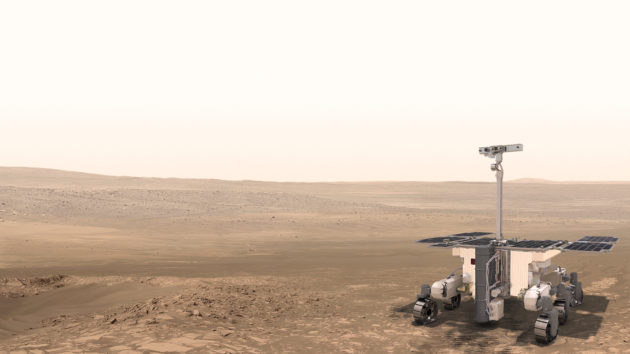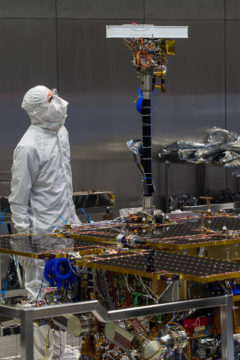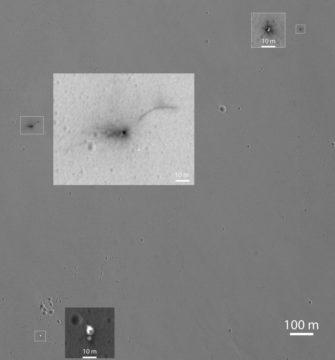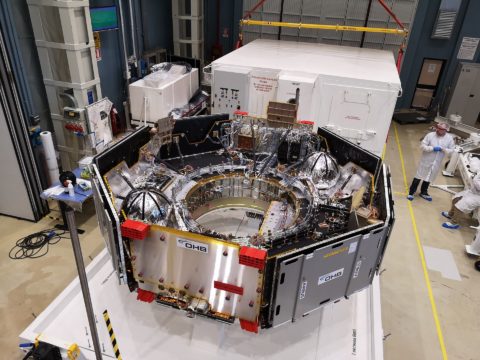The European Space Agency and Roscosmos have postponed the launch of their Mars lander and rover to the 2022 window.

ESA / ATG MediaLab
And then there were three. On March 12th, the European Space Agency (ESA) released a statement that the launch of the ExoMars mission, which will include the rover Rosalind Franklin, is postponed from this summer to the next launch window in 2022.
The decision comes after evaluation by project teams and the Russian and European Inspectors General, which concluded that more tests of the spacecraft hardware, software, and integration were needed. The slip comes amid the ongoing coronavirus pandemic, which has brought many activities in the European Union to a halt, and may compromise the final phase of ExoMars preparations.
“We want to make ourselves 100% sure of a successful mission,” says ESA Director General Jan Wörner in a recent press release. “We cannot allow ourselves any margin of error. More verification activities will ensure a safe trip and the best scientific results on Mars.”
The mission has faced delays before. Earth reaches an optimal launch window in terms of minimum time and fuel needed to head to Mars about every 26 months. In 2016 ESA delayed the rover from the 2018 to the 2020 launch window, citing difficulties working multiple projects in the ExoMars program in parallel and in a compressed timeline.

ESA / Airbus / M. Alexander
More recently, the team had experienced difficulties with its complex, two-part parachute system required for landing the probe on the Red Planet. Two high-altitude field tests in May and August of 2019 resulted in damage to the main parachute canopies. The team successfully completed ground-based parachute extraction tests at NASA’s Jet Propulsion Laboratory last December. Two high-altitude field tests of the main landing parachutes remain scheduled to take place over the Tillamook test range in Oregon later this month.
ExoMars: The Story Thus Far
On October 19, 2016, the ExoMars team lost its Schiaparelli lander over Meridiani Planum. The probe was a technology demonstrator for entry, landing, and descent on the REd Planet. An investigation later revealed that an erroneous altitude reading caused the spacecraft to eject its back-shell and parachute early, cutting the braking thrusters, which resulted in the lander slamming into the Martian surface. As a test bed for the team's full scale rover, Schiaparelli represented lessons learned, which will be paid forward to the landing of Rosalind Franklin.

NASA / JPL-Caltech / University of Arizona
The Trace Gas Orbiter that accompanied Schiaparelli has, however, been a shining success story for the ExoMars project, arriving in orbit and studying the Red Planet since late 2016.
Meanwhile, development of the ExoMars rover, built by aerospace manufacturers Astrium and Airbus, is progressing. The rover recently passed vacuum and thermal tests in France, along with flight hardware integration.

ESA / Thales Alenia Space
The rover was named Rosalind Franklin after the pioneering chemist and X-ray crystallographer, who was central to unveiling the molecular structure of DNA and RNA. Like NASA's recently named Perseverance rover, the Rosalind Franklin is an astrobiology mission, looking for evidence for the history of water on Mars and prospects for early life. Rosalind Franklin will land at Oxia Planum, with Mawrth Vallis and Aram Dorsum as possible backup sites.
The Roscosmos contribution to the mission is the Proton launch rocket and Kazachok landing platform, also equipped with 13 scientific instruments.
The slip now leaves three missions set to head to the Red Planet this summer: NASA’s Perseverance rover, the United Arab Emirates’ Mars Hope orbiter, and China’s first Mars mission, the Huoxing 1 orbiter and lander. If all goes well, Rosalind Franklin will depart in the August to October 2022 time frame.
In the end, the move is a prudent one, as lessons learned in the continuing ExoMars program are paid forward . . . and the "Great Galactic Ghoul of Mars" certainly doesn’t need to consume any more tasty spacecraft.
 0
0








Comments
You must be logged in to post a comment.